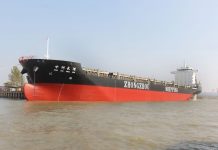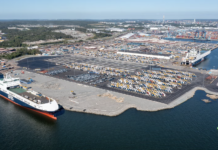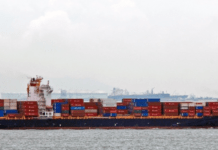
BANDS Financial and Linerlytica launch the first virtual container freight futures trading competition exclusively for companies and executives in the container shipping sector along the Asia-Europe route.
In an interview with Antonis Karamalegkos, Managing Editor of Container News, Johnson Leung, Director of Linerlytica, and Tiger Shi, CEO of BANDS Financial, discussed the competitive landscape, future project plans, and the goals driving this initiative.
- To start, could you give us an overview of the competition? Specifically, could you discuss its structure, schedule, and key components?
Tiger Shi: We set up this simulated trading competition to let companies and people in the industry try their hand at trading container freight futures just like traders would in the real market but without any risk of losing real money.
We’ll have two separate leagues for companies and individual participants and starting on 3 June, the competition will run for six months. In the end, those with the highest account equity are going to win, so essentially those who made the most profitable trades during the competition.
Johnson Leung: We want to make sure the competition can really introduce the participants to how futures trading would work in a real market environment, so all participants will get access to an actual futures trading application. We’re also organizing seminars to introduce futures trading and make sure participants come away from this with a solid understanding of how it works and how they might use it in their business. In fact, we just hosted our first webinar last week and it was amazing to see the interest from all across the industry.
- How did the idea for this competition come about? What inspired its creation?
JL: Having been in the industry for quite some time, I’ve seen previous attempts at launching container freight futures, but ultimately they all struggled with little industry adoption and trading interest. The new CoFIF contract is very different from these past attempts though: it’s traded on a properly regulated exchange, it has already gained massive trading interest and it’s available for trading internationally and in China, which really helps with liquidity.
TS: Exactly, and for BANDS, as a broker, we saw an opportunity to reach out beyond just the financial market and actively talk to people in the industry. And from what we heard, there was initially a lot of hesitation because a) futures are a completely different animal for the container shipping industry and b) the contract was very new and, unlike in the metals or energy industries where futures are fundamental to how products are priced, in shipping, especially container freight, there just was very limited understanding, and so that’s really what we’re looking to address with the competition.
JL: The idea is to take the best of both worlds, on the one hand, people can use proper trading software and trade on a market that fully reflects the real market, but at the same time there’s no risk of losing money, so it’s completely a learning experience. The competition helps you stay on top of the market by expressing your view based on your own understanding of the shipping market. Plus, more importantly, it’s a chance to learn how the futures work and how they could help you one day. Obviously, there is also just motivation because you to want beat the other participants!
- What are the primary goals of the competition? What do you hope participants will gain from this experience?
JL: The most important goal is to let managers and professionals from the container shipping industry gain experience in the futures market, so they can eventually make informed decisions about if and when to use futures and how to best take advantage of the opportunities that the futures market offers.
TS: We hope that participants come away from this competition with a detailed understanding of how the futures market functions and how they can add this tool into their toolbox, to use it with confidence once they spot an opportunity. Ultimately, the companies that gain access to the futures market the earliest will benefit the most.
- How do you see the role of CoFIF in the future? How do you think it could benefit the industry?
TS: We see two distinct use cases: hedging and price discovery. For hedging, sellers and buyers of ocean freight could protect themselves against volatile spot rates by locking in prices with futures. And in terms of price discovery, futures could provide a transparent price for all industry participants, just like they already do, for example, in gold or oil, so users can make sure that the price they’re paying or receiving is the fair price paid and accepted by most other market participants. That’s really important because the liner market has an information asymmetry problem in pricing; too often, even those who think they have the information advantage only see part of the picture and don’t know the true market price. So price quotation and acceptance tend to be driven by fear and rumors. A futures market can give continuous updates for pricing – and not just quotations, but transactions with payments actually happening and continuously validating that price.
JL: While buyers and sellers can already hedge with enforceable contracts, sometimes the contracts and hence the ocean freight rates are not actually fixed, either because the contracts are index-linked or because they come with conditions whereby freight rates could become floating during the peak season, etc. It also takes time to find takers and reach agreements for cargo or shipping slots at market price. With a liquid futures market, industry players could cover all their cargo or shipping slots in a fairly efficient fashion without having to find a counterparty or worry about whether that counterparty could perform.
- How has participation been so far? Are you satisfied with the number and diversity of participants?
JL: Of course, we hope to see more contestants, especially for the company league where we only have a few companies that signed up so far. But in the individual league, we’re quite happy with who signed up so far. It’s a diverse set of participants, with managers from major liners, procurement managers from NVOs, ship owners, ocean managers of BCOs as well as analysts with a research focus on freight rates, freight futures brokers, etc. So it’s a really wide range of contestants from different backgrounds with exposure to freight rates in their day-to-day roles.
- Where can interested people find out more about the competition? Is it still possible to sign up?
JL: Yes, it’s still possible to join. The competition is running until the end of November, and since we want to make this primarily an opportunity for anyone interested in learning about container freight futures, you can just visit the competition website (https://bands.financial/cofif-competition-2024/index.html) to learn more and register.
- Looking ahead, do you have plans to organize similar projects or competitions in the future? If so, can you share any details?
JL: We do, ideally we’d like to make this an annual event and develop this into a platform where managers exposed to freight rate volatility can come to learn and exchange hedging strategies, and a place where the liner industry could identify their future ocean freight managers.








